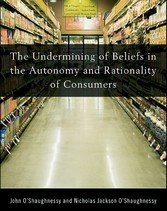
The Undermining of Beliefs in the Autonomy and Rationality of Consumers

von: John O´Shaughnessy, Nicholas O´Shaughnessy
Routledge, 2008
ISBN:
Sprache: Englisch
154 Seiten, Download: 981 KB
Format: PDF, auch als Online-Lesen
"3 The claims made by postmodernism (p. 61-62)
Introduction
Part I dealt with the attack on belief in free will and the claim that what we take to be the work of conscious deliberation is the result of unconscious causes lying behind whatever we do. Of course, we are constrained from acting completely in accordance with wants and beliefs by our resources, ability and access to opportunities. But we still believe we are free agents though we might be prepared to underwrite compatibilism—that free action is compatible with the belief that all events are nonetheless caused. However, it may well be that the unconscious does act on occasions as a gatekeeper for what is recalled in memory, as we consider the pros and cons in deciding whether to go this way or that. But whatever is recalled or enters into the mind through the senses can be churned over to reach new beliefs, wants, and actions. We are free agents, within very broad limits, and morally responsible if we choose to be so.
Part II is a different type of attack on what we believe about ourselves. It is an attack on our ‘pretensions’ to rationality and our notions of accessing Reality as it is. Postmodernism is in fact a radical perspective on the way we interpret the world. It is a perspective that undermines faith in reason as the basis of progress and casts doubts on our ability to make reliable decisions and share judgments. Philosopher Galen Strawson (2002) sums up postmodernism as follows.
(Postmodernists) ""say the strangest things. They say that there is no such thing as the way the world is, considered as it is in itself—that is, independent of ourselves and our concepts. They say that the idea of objectivity, the idea that science aims at and sometimes attains the truth about how things are, is incoherent—a foolish bauble left over from the babyhood of thought. They say that all we really do, when we do science, is spin a great system of sentences, and although we like to think these sentences state how things are, we are wrong. The sentences play only with one another, they don’t connect to reality, they’re not made true or false by the way the world is. According to Richard Rorty, one of the high priests of this church, ‘only a sentence can be relevant to the truth of another sentence’. So don’t appeal to the way the world is, for there is no such thing"" (p.12).
This is not such an unfair description of the dominant French version of postmodernism even if it selects the assertions of postmodernism most likely to exasperate readers. We review the arguments that lead to such claims to see if there is something of merit that can be salvaged. This review forces us to examine things we take for granted in undertaking marketing inquiries and doing social science generally. There is analogy with radical skepticism. Harman (1973) claims that much of current epistemology (the theory of knowledge) in philosophy is best viewed as a response to the thesis of radical skepticism: that we never have the slightest reason to believe anything."







